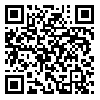Volume 15 - Legal Innovation
MLJ 2021, 15 - Legal Innovation: 513-533 |
Back to browse issues page
Download citation:
BibTeX | RIS | EndNote | Medlars | ProCite | Reference Manager | RefWorks
Send citation to:



BibTeX | RIS | EndNote | Medlars | ProCite | Reference Manager | RefWorks
Send citation to:
Haji Ali M, Andarz D. Innovations in the reform of the law on the issuance of checks and its legal gaps. MLJ 2021; 15 :513-533
URL: http://ijmedicallaw.ir/article-1-1396-en.html
URL: http://ijmedicallaw.ir/article-1-1396-en.html
1- Islamic Azad University, Damavand Branch (Damavand), Tehran, Iran
2- Department of Private Law, Islamic Azad University, Damavand Branch (Damavand), Tehran, Iran
2- Department of Private Law, Islamic Azad University, Damavand Branch (Damavand), Tehran, Iran
Abstract:
Background and Aim: Checks as a means of cash payment, of course, in many cases as a tool for promising payments, is very popular with individuals, so it is used in many transactions, whether commercial or non-commercial and based on this, it is logical that more than any other issue, it has been considered by the legislator and, of course, it has been tested and made many mistakes.
Materials and Methods: This research is of theoretical type and the research method is descriptive-analytical and the method of data collection is library and has been done by referring to documents, books and articles.
Results: The new law provides banks with various obligations in relation to checks. In order to fulfill these obligations, there are gaps such as ambiguity in removing the effects of checks, ambiguity in the concept of damages to third parties.
Ethical considerations: In order to organize this research, while observing the authenticity of the texts, honesty and fidelity have been observed.
Conclusion: The new law has more dynamism and better adaptation to the real conditions of the society than the previous amendments to the check law, and there is a capacity for the gaps in this law to be clarified in the form of its executive regulations with details, and to be used by stakeholders.
Cite this article as: Haji Ali MT, Andarz D. Innovations in the reform of the law on the issuance of checks and its legal gaps. Medical Law Journal 2021; Legal Innovation.
Materials and Methods: This research is of theoretical type and the research method is descriptive-analytical and the method of data collection is library and has been done by referring to documents, books and articles.
Results: The new law provides banks with various obligations in relation to checks. In order to fulfill these obligations, there are gaps such as ambiguity in removing the effects of checks, ambiguity in the concept of damages to third parties.
Ethical considerations: In order to organize this research, while observing the authenticity of the texts, honesty and fidelity have been observed.
Conclusion: The new law has more dynamism and better adaptation to the real conditions of the society than the previous amendments to the check law, and there is a capacity for the gaps in this law to be clarified in the form of its executive regulations with details, and to be used by stakeholders.
Cite this article as: Haji Ali MT, Andarz D. Innovations in the reform of the law on the issuance of checks and its legal gaps. Medical Law Journal 2021; Legal Innovation.
Type of Study: Original Article |
Received: 2021/05/8 | Accepted: 2021/08/14
Received: 2021/05/8 | Accepted: 2021/08/14
Send email to the article author
| Rights and permissions | |
 |
This work is licensed under a Creative Commons Attribution-NonCommercial 4.0 International License. |






